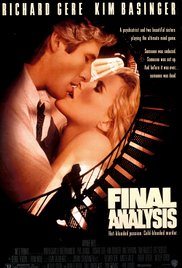Stand-In Central’s newest contributor, Peter Anderson, does it again with a story that had me laughing out loud.
While Peter’s prior story was about his time working as a stand-in, this time it’s about working as an extra. And while Stand-In Central focuses on stand-ins, there’s some nice insight and lessons in his story working two days as an extra on Final Analysis that can apply to stand-ins. (Oh, and there are definitely some things one might characterize as “what not to do”!)
Peter’s bio and all of his Stand-In Central contributions can be found here. Enjoy his story!
— The Editor
DAY ONE:
 In 1991, I was in the midst of a fun, successful career as a daily columnist for three papers in Northern California, so I certainly didn’t need the $93-per-day stipend to work as an extra, but … who wouldn’t want to meet Kim Basinger and Richard Gere?
In 1991, I was in the midst of a fun, successful career as a daily columnist for three papers in Northern California, so I certainly didn’t need the $93-per-day stipend to work as an extra, but … who wouldn’t want to meet Kim Basinger and Richard Gere?
The Warner Brothers film crew had taken over prime locations in San Francisco and Oakland for a filming of Final Analysis that would last a couple of weeks. The movie has now been on cable so many times, I hope you don’t think of me as a spoiler as I deliver this rapid-fire capsule summary:
Gere is a smooth San Francisco therapist who is smitten by two gorgeous patients, Uma Thurman and Kim Basinger. But he is really smitten by Basinger, who is seeking help for a troubled marriage with her mobster husband Eric Roberts and for the acute alcoholism that is shredding her sanity. Gere’s best prescription for helping her, of course, is sleeping with her. Who’d argue with that? Basinger is so grateful for tricky Dick’s intervention that she murders her husband, poor Eric Roberts, then tries to frame the hapless, naïve therapist, Gere, for the killing. You get the drift. Not the most original screenplay, but it is draped in such melodrama and pathos that you keep hoping to discover the greatness that never arrives.
But it is fun viewing the never-disappointing San Francisco scenery, with cable cars and Golden Gate Bridge shots galore, with some rather contrived Hitchcockian locations around the bridge that are simply not real. But who cares about the fake scenery when Gere and Basinger are engaged in French kissing and heavy petting while ensconced on a failing, crumbling lighthouse that is about to collapse into shark-infested San Francisco Bay waters? Try to breathe freely, however, because the worst that happens in this steamy sequence is that Kim’s sunglasses fall into the icy, frothing waters roiling beneath the Golden Gate Bridge while the sobbing film studio orchestra weeps.
If you’re getting the notion that this wasn’t The Great American Movie being filmed, you’re correct, but its patent absurdity and far-fetched credibility made it fun to be an extra in the ensuing bathos.
So then, my first goal – meeting Basinger and pledging to her my lifelong fidelity and passion – was immediately dashed when we the flock of extras received a memo ordering us not even to look at her. Apparently eye contact of any kind made her forget her lines. I also noticed that she was trailed everywhere by a dutiful assistant holding a parasol above Kim’s precious head, both indoors and outside, because of her hypersensitivity to sunlight … even, apparently, in fog-locked San Francisco.
I am a sneaky guy, however, and I arranged for a “chance” meeting with Basinger that made me seem heroic in her eyes. I noticed that between takes, she kept to herself and read books, sitting almost unseen on a folding chair in the shadows. We were in an Oakland hospital, and there was a pedestrian bridge three stories up connecting two wings of the hospital. Every so often, Kim would stand up, stretch, and walk out into the sunlight for some deep breathing exercises. Timing it perfectly, I situated myself in mid-bridge, staring and brooding at the Bay Area landscape in the distance, trying to appear nonchalant, reflective and not at all awestruck by famously sexy actresses with pouty lips. And oh … I also adjusted the door’s lock so that once Kim came outside, we would be stranded together on the bridge. If it weren’t for that damned parasol lady, Kim and I may have been married by now with three kids in therapy.
Much to my joy, here came Kim – with parasol lady leading the way – onto the bridge. She leaned against the wall a mere five feet away from me, and started doing some deep breathing exercises. Her personal wall even fell down for a brief few seconds when she happened to glance my way, nodded and grinned, and actually said, “You’re with the cast, right? I have seen you being very studious.” This would’ve been a perfect time to drop dead, but I plowed on. “And I must say it is a great honor working with you, Ms. Basinger.” She smiled broadly and actually blushed. Good God, I might even win an Oscar for this performance! Thoughts of that lowly stagehand and driver on a film set who ended up in a scandalous romance with Marilyn Monroe raced through my head. They even made a movie out of it years later – My Week With Marilyn, 2011.
Then Kim and parasol lady turned to leave toward the locked door. I watched as they froze in their tracks, their bodies stiffening in full pre-panic mode. “No worry, ladies, I have a phone.” Now, nobody had a phone in 1991, but I had this clunky early-design cell phone I was holding for one of the guys on the construction set who had left for a lunch break. He had asked me to hold it for him because he had lost three of them to theft in earlier movies. One of the automatic dials was set for the Assistant Director, so I immediately called this guy and asked him to come and rescue me and Kim Basinger and the parasol lady. Talk about clever, eh?
Kim turned to thank me, and actually blew me a kiss. Now I was ready to die.
The real relevance of this story is that I had caught the eye of the Assistant Director. A couple of hours later, after watching take after boring take of Richard Gere walking alone down a busy hospital corridor, the Assistant Director walked over to me and said, “We need someone in this scene with Gere.” He threw me a smock and said, gruffly, “Say something to him while you walk next to him. You’re a doctor.”
Now I was in business. As many extras know, once you get an audible line in a movie, no matter how brief or indistinct, your daily salary jumps by about 1,000% and you qualify for a SAG-AFTRA card. My cinematic ship was about to enter harbor. Red carpet, get vacuumed.
While the crew was setting up for my big walk scene with Gere to begin, he approached me at the nearby coffee table where I was eating a doughnut and sipping an espresso. “Hey man,” he said while shaking my hand, “thanks for doing this. Sometimes in movie making, we have to shift into impromptu mode. Tell me about yourself?”
I nearly choked on my doughnut. I started sputtering about my San Francisco roots, my career as a journalist, my admiration for him as a Buddhist and activist, and, for some odd reason, my love of Willie Mays. Gere’s eyes widened and he giggled that silly little guffaw I have heard in the movies from him scores of times. “No way!” he practically squealed. “Willie is my all-time hero in life! I grew up on the East Coast, so he was my idol all through childhood. When you guys stole our Giants and they moved West, I was crushed, really heartbroken.”
This was turning out to be a very good day. Until …
“C’mon, you guys, quit the gabbing!” snarled the very crude and rude Assistant Director. “Take your marks,” he barked. “And … action!”
Gere grabbed me by the elbow and together we walked down the hospital corridor, looking grim and concerned. “Say something,” he whispered. That’s when the horror enveloped me. Nobody had given me a line! Instead of chatting about Willie Mays, I should’ve been talking business with both Gere and the Assistant Director in preparation for this opportunity. One lousy line may have changed my life forever.
Gere asked me in a louder voice, “What’s your prognosis, Doctor, is she an acute alcoholic or just a low-level case?”
Remember, I had no line. I was lost. I blurted out, “I was at that game where Juan Marichal of the Giants hit the Dodgers’ catcher John Roseboro on the head with a bat, and Willie Mays came racing out of the dugout to save the day, pulling Marichal away.”
Gere ceased walking, dead stop. The entire crew froze. The omnipresent mics picked up every word. The rude, crude Assistant Director said, “What the f*** was that? Are you a crazy person?”
I was crestfallen. I had honestly thought it was just a dry run, a fake take just to get the lighting and the focus and the mics just so. The Assistant Director snatched the smock from my back, and said, “Do you have any idea what is happening here?”
Instead of backing off, I shot back, “It would’ve helped if I had been given a line, don’t you think?” The Assistant Director’s face turned red, and he stormed off; Gere was incredibly comforting. He patted me on the back and said, “Don’t worry about that guy, he can be incredibly rough. You did the best you could. They forget that extras get no script.”
Then Gere went into a huddle with the Assistant Director and Director, and shortly after one of the other crew members came over to me and said, “You did great, and you looked really sharp on the video run, but we have decided that your hair color and length are way too similar to Richard’s, plus you are about five inches taller.” No mention of the botched line, which was thoughtful, but I still needed comfort. Where was my Kim when I needed her for a hug?
DAY TWO:
I never give up on anything in life, so I showed up the next morning at the new location, a fancy, toney San Francisco restaurant named Bix. It was a Sunday morning, so it seemed weird filming a dinner scene, but the show must go on.
The actors could not have been nicer to me. I noticed that hugging on a film set is very common; there’s a collegiality and mutual support you don’t see in many other professions. And, even though actors and extras rarely mingle, I was learning that some rules are flexible.
I had splashed some water on my face in the men’s room to shake the cobwebs loose, and as I was walking out, Eric Roberts was walking in. He paused and said, “Hey, big guy, you did great yesterday. I liked the way you shook it off, and it’s good to see you back in action! “ Then he gave me this massive bear hug. I resisted the urge to ask him for his sister’s digits – Julia Roberts – and thanked him profusely for his encouragement. Then I praised him for his 1984 classic, The Pope of Greenwich Village.
“Dude!” he shouted. “My all-time favorite! Thanks, man!”
This day was starting off decidedly better.
The scene about to be set inside Bix was tense and dramatic. Briefly, Kim Basinger and Eric Roberts, unhappily married yet dining out in elegance, were sitting at a center table, dressed to the nines and engaged in a low-level argument over Kim’s drinking. The looks she was giving her husband were downright diabolical as she defiantly sipped wine from her glass. Yet, through the rage and the smoldering resentment etched all over face, she was absolutely stunning.
Her looks were not lost on Richard Gere, who was sitting at the bar and gazing at her from the large mirror on the wall in front of him. In this scene in the movie, you can actually see me chatting with friends. My job was to say goodnight to them, and walk behind Gere at the bar, tap him on the back outside of camera range, and this would be his cue to stand up and walk over to the dining room to stare lustfully at his new patient/lover Basinger.
The scene took about nine hours, all day. Gere was in an expansive, cheerful mood, and he paused between takes to pluck ivories for us at the piano situated right next to the bar. He mixed in some lively jazz with some somber classic. He was damn good. Then someone reminded him it was Mother’s Day, so he dropped everything, asked to borrow the construction guy’s cell phone that I had used the day before, and called his mother on the East Coast. This scored him all sorts of admiring moans from the many well-dressed young lady extras swooning at him from the dining room, especially when they could hear him say, “I love you, Mom!” at the end.
Kim Basinger, on the other hand, seemed pensive, moody, and annoyed. No doubt she was trying to get into character for the difficult, confrontational scene she was about to embark over dinner, but I like to think that she was brooding over not being able to be partying with me while I told stories and laughed with Gere and the others at the bar. (A man can dream, right?) Richard, by the way, found out I used to be a bartender in San Francisco, so he asked me to teach him how to play Liar’s Dice.
I started bragging how I used to enhance my salary while tending bar at San Francisco’s toniest steakhouse, Victoria Station, while liberating customers from their cash when challenging them to Liar’s Dice, and Gere grinned and said, “Wow, teach me good, I need to enhance my own salary.” I assume his joke was as dry as a classic Martini, because those of us on the set had heard he was pulling down $7 million for his leading man role in Final Analysis.
This scene also called for him to be thinking deeply over a glass while obsessing about Kim, but he seemed torn between a cocktail glass and a shot glass. “Hey barkeep!” he yelled in my direction. “How should I be drinking this whisky?” I lobbied hard that he drink from a shot glass, but in the movie, my nemesis, the rude and crude Assistant Director, decided that he should drink the shot without ice from a water glass. When and if you see the scene in the film, you will see that my advice was way better – another fee for which I was not paid!
Much of the foregoing has been lighthearted and deliberately self-effacing, but there were some moments in the production of the bar scene at Bix that were downright somber and poignant.
Not being a movie insider at all, I had no idea I was working with greatness that day. His name was Jordan Cronenweth, one of the most revered and accomplished American cinematographers in film history. The young director of Final Analysis, an up ’n coming New Breed guy named Phil Joanou, was having trouble on this day with this scene, which was technically complicated. The goal was to capture Gere at the bar, reflecting and drinking, while also including in the shot the main dining room where Basinger and Eric Roberts were eating and arguing.
The director put a call into Warner Brothers and begged for someone to put Jordan Cronenweth on a plane to San Francisco. This was controversial because Cronenweth had recently been diagnosed with Parkinson’s Disease, and his health was failing rapidly. But show up on set he did – one reason why the filming took up most of Sunday. When he arrived at Bix, there was an almost reverential silence as Cronenweth walked slowly around the room hugging various members of the cast and crew, especially Gere, who looked shiny-eyed and grateful for his presence.
After several minutes of surveying the complex scenery, Cronenweth decided to set up a “train track” behind the bar upon which to affix the camera. That way, the scene opens up with a smoothly rolling pan shot from left to right until the lens focuses on Gere sipping from his drink, and, just behind him – ahem! – me saying goodbye to my friends.
It was awesome and touching to watch the ailing cinematographer work so slowly and methodically, and at one point he asked me to get him some ice water, thinking I was the actual bartender on duty. I did so gladly.
Sadly, this would be Cronenweth’s final film; he passed in 1996.
I like to think this is the signature scene in the movie. Of course I would! But actually and quite seriously, it did have special meaning for me, because everything went very well and happily, especially considering the disastrous and embarrassing moments from the day before. In the years since, I have often used this story as a way to explain to my children and some friends the necessity of always hanging in there in life, never giving up despite all obstacles. And however modest my role, I have the DVD – and the sweet memories – as proof.




Leave A Comment